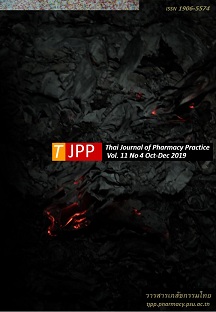ความคลาดเคลื่อนทางยาและการเกิดเหตุการณ์ไม่พึงประสงค์ในผู้ป่วยที่ได้รับยาเคมีบำบัด
Main Article Content
บทคัดย่อ
วัตถุประสงค์: เพื่อศึกษาชนิด ความถี่ ความรุนแรงของความคลาดเคลื่อนทางยา (medication errors: MEs)และหาความสัมพันธ์ระหว่างการเกิด ME กับการเกิดเหตุการณ์ไม่พึงประสงค์จากยา (adverse drug events: ADEs) ในผู้ป่วยที่ได้รับยาเคมีบำบัด วิธีการ: การศึกษานี้เป็นวิจัยเชิงพรรณนา ณ จุดเวลาใดเวลาหนึ่งแบบตัดขวาง โดยเก็บข้อมูลจากแบบฟอร์มการสั่งใช้ยาที่พิมพ์ล่วงหน้าจำนวน 137 ใบสั่งยา นอกจากนี้ การศึกษายังสังเกตการปฏิบัติงานของเภสัชกรที่หน่วยเตรียมยาเคมีบำบัด การปฏิบัติงานของพยาบาลบนหอผู้ป่วย และการเกิด ADEs ในระหว่างการรักษา ผลการศึกษา: ตัวอย่างส่วนใหญ่ได้รับการวินิจฉัยว่าเป็นมะเร็งเต้านม (71 ราย หรือร้อยละ 51.8) ผู้ป่วยส่วนใหญ่เข้ารับการรักษาที่หอผู้ป่วยนรีเวช (67 รายหรือร้อยละ 48.9) สูตรยาที่ผู้ป่วยได้รับส่วนใหญ่เป็นสูตร FOLFOX-4 ( 64 รายหรือร้อยละ 46.7) การศึกษาพบ MEs 406 ครั้ง โดย ME ที่พบมากที่สุด ได้แก่ ความคลาดเคลื่อนในการบริหารยา (325 ครั้ง หรือร้อยละ 80.05) รองลงมา คือ ความคลาดเคลื่อนในการจ่ายยา (74 ครั้งหรือร้อยละ 18.23) ความคลาดเคลื่อนในการสั่งใช้ยา (7 ครั้งหรือร้อยละ 1.72) ADEs ที่พบมากที่สุด ได้แก่ ผมร่วง (95 รายหรือร้อยละ 62.0) เบื่ออาหาร (75 คนหรือร้อยละ 54.7) และคลื่นไส้ (74 คนหรือร้อยละ 54.0) ผลการวิเคราะห์ข้อมูลไม่พบความสัมพันธ์ระหว่าง MEs กับ ADEs สรุป: MEs ส่วนใหญ่เกิดในขั้นตอนการบริหารยา การพัฒนาระบบบริหารยาและเพิ่มพูนความรู้และทักษะของผู้ปฏิบัติงาน อาจช่วยลด MEs ลงได้
Article Details
ผลการวิจัยและความคิดเห็นที่ปรากฏในบทความถือเป็นความคิดเห็นและอยู่ในความรับผิดชอบของผู้นิพนธ์ มิใช่ความเห็นหรือความรับผิดชอบของกองบรรณาธิการ หรือคณะเภสัชศาสตร์ มหาวิทยาลัยสงขลานครินทร์ ทั้งนี้ไม่รวมความผิดพลาดอันเกิดจากการพิมพ์ บทความที่ได้รับการเผยแพร่โดยวารสารเภสัชกรรมไทยถือเป็นสิทธิ์ของวารสารฯ
เอกสารอ้างอิง
2. National Cancer Institute. Cancer stat facts: cancer of any site [online]. 2017 [cited Feb 3, 2016]. Available from: seer.cancer.gov/statfacts/html/all.html.
3. Cronin KA, Lake AJ, Scott S, Sherman RL, Noone AM, Howlader N, et al. Annual report to the nation on the status of cancer, part I: national cancer statistics. Cancer 2018;124:2785-800.
4. National Statistical Office Thailand. Number of patients/cause of death [online] 2016. [cited Feb 6, 2016]. Available from: service.nso.go.th/nso/web/stat series/statseries09.html#.
5. Weingart SN, Zhang L, Sweeney M, Hassett M. Chemotherapy medication errors. Lancet Oncol 2018; 19: e191-9.
6. Phillips J, Beam S, Brinker A, Holquist C, Honig P, Lee LY, et al. Retrospective analysis of mortalities associated with medication errors. Am J Health Syst Pharm 2001; 58: 1835-41.
7. Rinke ML, Shore AD, Morlock L, Hicks RW, Miller MR. Characteristics of pediatric chemotherapy medi cation errors in a national error reporting database. Cancer 2007; 110: 186-95.
8. Ranchon F, Salles G, Späth H-M, Schwiertz V, Vantard N, Parat S, et al. Chemotherapeutic errors in hospitalised cancer patients: attributable damage and extra costs. BMC Cancer 2011;11:1-10.
9. Tungjaroen D, Rungsiyaphornrat U, Phisetkul C. Chemotherapy error in cancerous patients. Thai Journal of Hospital Pharmacy 2005;15:246-53.
10. Jirapraphusak K, Phochanikorn T. Medication Errors in Pediatric Chemotherapy Patients. Buddhachinaraj Medical Journal 2007; 24:259-65.
11. National Coordinating Council for Medication Error Reporting and Prevention. NCC MERP Index for Categorizing Medication Errors [online] 2016. [cited Feb 3, 2016]. Available from: www.nccmerp.org/site s/default/files/indexBW2001-06-12.pdf.
12. Suwankesawong W, Sriphiromya P, Tragulpiankit P, Phetcharat C, Sornsrivichai V. Evaluation of Thai algorithm usage for adverse drug reaction monito- ring. Journal of Health Science 2016;25:673-82.
13. National Cancer Institute. Common Terminology Criteria for Adverse Events (CTCAE) [online]. 2016. [cited Sep 5, 2016]. Available from: ctep.cancer.gov /protocolDevelopment/electronic_applications/ctc.htm#ctc_40
14. National Coordinating Council for Medication Error Reporting and Prevention. About medication errors [online] 2016. [cited Feb 3, 2016]. Available from: www.nccmerp.org/about-medication-errors.
15. American Society of Health-System Pharmacists. ASHP guidelines on preventing medication errors in hospitals. [online] 2016. [cited Feb 3, 2016]. Available from: www.ashp.org/DocLibrary/BestPrac tices/MedMisGdlHosp.aspx.
16. Walsh KE, Dodd KS, Seetharaman K, Roblin DW, Herrinton LJ, Von Worley A, et al. Medication errors among adults and children with cancer in the outpa- tient setting. J Clin Oncol 2009;27:891-6.
17. Collins CM, Elsaid KA. Using an enhanced oral chemotherapy computerized provider order entry system to reduce prescribing errors and improve safety. Int J Qual Health Care 2011; 23: 36-43.
18. Schwartzberg D, Ivanovic S, Patel S, Burjonrappa SC. We thought we would be perfect: medication errors before and after the initiation of computerized physician order entry. J Surg Res 2015;198:108-14.
19. Markert A, Thierry V, Kleber M, Behrens M, Engelhardt M. Chemotherapy safety and severe adverse events in cancer patients: strategies to efficiently avoid chemotherapy errors in in- and outpatient treatment. Int J Cancer 2009;124:722-8.
20. Elsaid K, Truong T, Monckeberg M, McCarthy H, Butera J, Collins C. Impact of electronic chemothe rapy order forms on prescribing errors at an urban medical center: results from an interrupted time-series analysis. Int J Qual Health Care 2013;25:656-63.
21. Jeon J, Taneva S, Kukreti V, Trbovich P, Easty AC, Rossos PG, et al. Toward successful migration to computerized physician order entry for chemothe rapy. Curr Oncol 2014;21:e221-8.
22. Ulas A, Silay K, Akinci S, Dede DS, Akinci MB, Sendur MA, et al. Medication errors in chemotherapy preparation and administration: a survey conducted among oncology nurses in Turkey. Asian Pac J Cancer Prev 2015;16:1699-705.
23. Osborne J, Blais K, Hayes JS. Nurses' perceptions: when is it a medication error? J Nurs Adm 1999; 29: 33-8.
24. Beyea SC, Hicks RW, Becker SC. Medication errors in the OR-a secondary analysis of Medmarx. AORN J 2003;77:132-4.
25. Sharma A, Kumari KM, Manohar HD, Bairy KL, Thomas J. Pattern of adverse drug reactions due to cancer chemotherapy in a tertiary care hospital in
South India. Perspect Clin Res 2015;6:109-15.
26. Chopra D, Rehan HS, Sharma V, Mishra R. Chemotherapy-induced adverse drug reactions in oncology patients: A prospective observational survey. Indian J Med Paediatr Oncol 2016;37:42-6.


